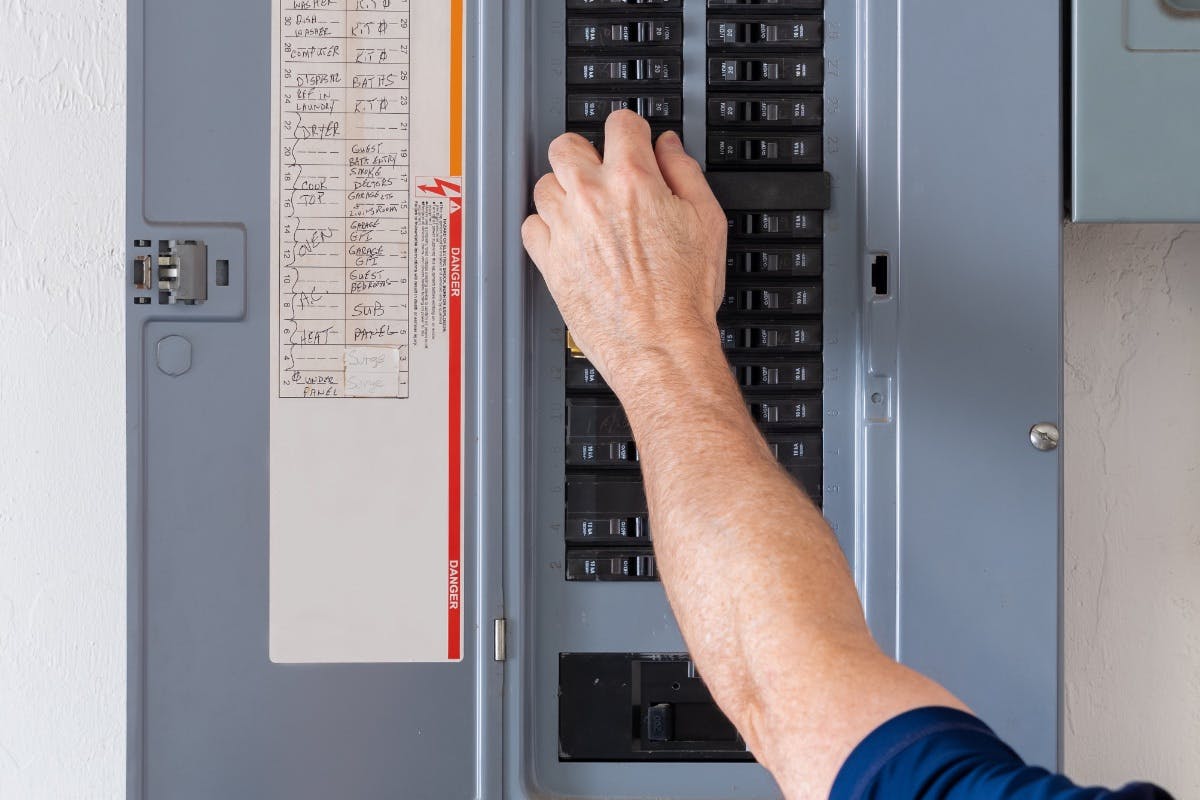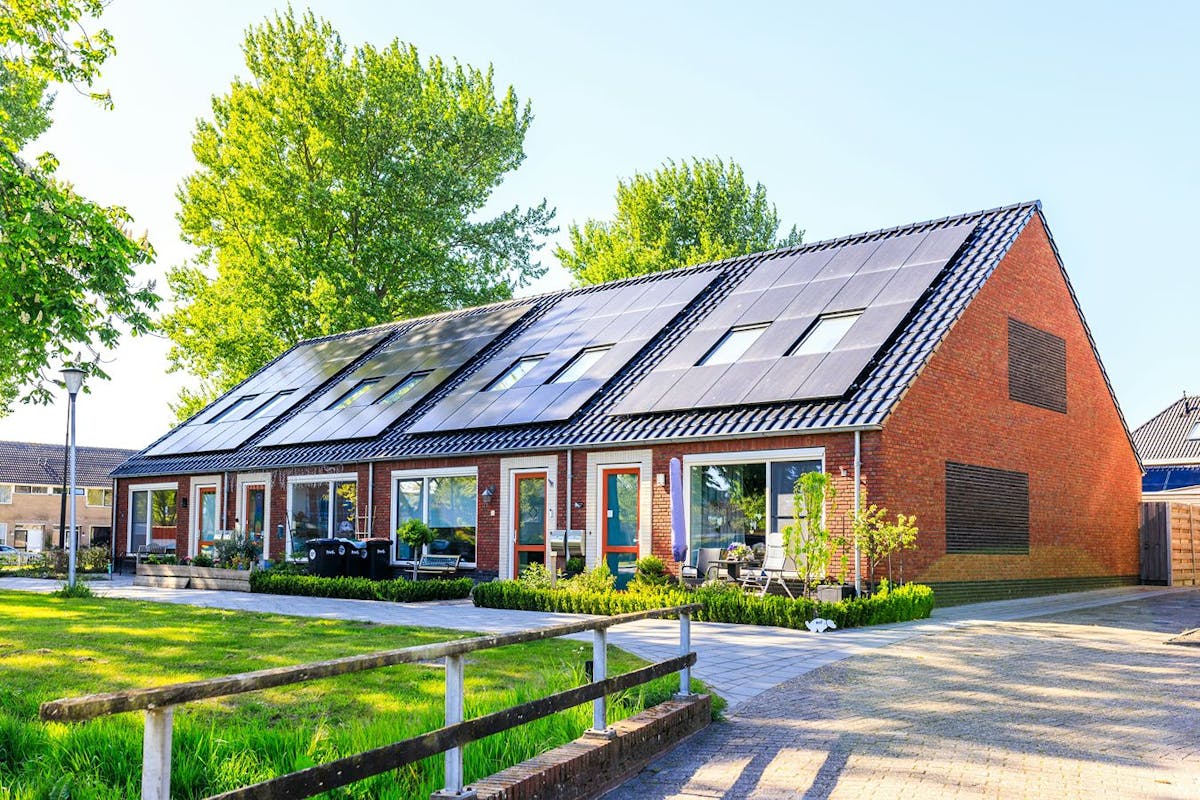Electrical Panel, Breaker Box, Circuit Breakers: What to Know
Last edited

Author
Andrew Giermak
Solar and Electrification Writer and Editor

Editor
Ryan Barnett
SVP, Policy & New Market Development

You might go months or longer without needing to use your electrical panel (or breaker box, or circuit breaker, or fuse box, whatever you call it). Hopefully you can go that long without a power outage, power surge, or need to reset a breaker.
If you’re installing home solar panels or moving to home electrification, you may need a new, upgraded electrical panel. You might even consider a smart electrical panel. What more should you know about the safety and functionality of that grey metal box in your garage or basement? Here’s what you need to know about this important part of your home’s power system and electrical safety.
See how much you can save with home energy changes
What Is an Electrical Panel?
An electrical panel controls the flow of electricity to specific circuits around the house, and includes a protective fuse or circuit breaker for each circuit. Think of it as the brain of your home electrical system, as it connects the power from the electricity grid (and your home's solar panels, if you have them) to your outlets and appliances.
What Does an Electrical Panel Do?
An electrical panel distributes power around your home. Your outlets and switches are grouped together into circuits, which just means power flows out of the electric panel, through wires connecting the outlets and switches, and then back into the electric panel to form a complete loop, or branch circuit.
Your electrical panel is also designed to protect the home from electrical damage resulting from power surges and overloads.
- A power surge occurs when the electrical current spikes beyond the expected range, such as when there is a lightning strike, a grid problem, or an issue with a large appliance.
- An overload can happen when a circuit receives more amperage than it's built to handle, such as when numerous running appliances require more power than the panel can give. When the current moving through any given circuit breaker exceeds a set limit, the electric panel will automatically break the flow of power for that circuit to protect your home.
How Do Electrical Panels Work?
To understand how electric control panels work, we can start with their anatomy, including the various components and the functions they perform.
Enclosure
This is the actual box containing the various components operating your electrical system. The electrical panel box is usually made from metal, typically gray in color, and usually has one or two doors covering the equipment and circuit wiring to restrict access to the home’s breaker box.
In addition to individual circuit breakers, the enclosure houses the ground bar or neutral bus, which is where the ground wires from each circuit are terminated.
The enclosure prevents water from getting onto the wiring, contains electrical discharges, and keeps dust and other pollutants at bay.
Main breaker
This switch controls the entire flow of current to your house, including power from utility companies. While you can manually flip it yourself, the breaker panel will automatically trip the main breaker to stop current flow whenever a major overload happens. In case of an electrical emergency at home, this is the switch you should flip to cut the supply of power to everything in your house.
See how much you can save with home energy changes
Single pole breakers
Single pole breakers (often 15 amp or 20 amp rated) facilitate power flow to your appliances and outlets, protecting them from electrical damage when there is a short circuit. If this component detects abnormal current, the breakers are designed to trip (flip to the off position) to stop the flow of electricity and ensure no damage is done to your electronics. As a result, they can safely stop a problem on one circuit without affecting power flow to the rest of the circuits.
Double pole breakers
Double pole breakers support the larger appliances in your house, such as an air conditioner, electric range, electric clothes dryer, electric water heater, and even hot tubs. Normally these breakers are wired to serve a single 240-volt circuit, but they can also be wired to serve two separate 120-volt circuits. A double pole breaker contains two hot wires with a single neutral wire, allowing the flow of electricity to be stopped if there’s an issue with either hot wire.
Arc fault circuit interrupters
An arc fault circuit interrupter (AFCI), also known as an arc fault detection device (AFDD), prevents electrical fires from breaking out inside your home by detecting issues before they can generate the heat and sparks that cause fire. Think of an AFCI like a smart breaker that contains filters and logic devices to detect problems. Electrical fires are difficult to detect unless you are on scene, so these circuit breakers identify arcs in electricity and respond automatically to stop power flow whenever the risk of fires is detected.
Empty slots
If you look closely at your breaker box, you might notice some blank spaces without a circuit breaker. These empty slots give you capacity to install additional circuits in the future if needed.
Subpanels
If you have a large home with multiple separate areas or wings that need electricity, a subpanel helps direct electricity more efficiently. Instead of running all of the circuits through one breaker panel, you can subdivide the distribution of your home’s electrical loads through these smaller panels designed for specific areas of your home.
Common Electrical Panel Sizes
Electrical panels come in different sizes, depending on the electricity demand of your home. Electrical panel size is measured in amps.
Older homes might have electrical panels as small as 60 amps, though those panels may have difficulty dealing with the electricity use of a typical modern home, NYSERDA says. A 200 amp panel is likely large enough for a fully electric home, though some homes have panels up to 400 amps.
The Various Names for an Electrical Panel
Electrical panels often go by other names because of their function or appearance. Here are some of the more common names for this important part of your home’s electrical system, and why it may have been given that name.
- Breaker panel or breaker box: It’s the location where the breakers live.
- Circuit breaker, circuit breaker box, or circuit breaker panel: It’s the box where the circuit breakers are contained.
- Distribution board or DB board: The panel is shaped like a board and it distributes power to the entire house.
- Electrical service panel or electrical control panel: If your home’s electrical systems need servicing, this is the place where that work begins.
- Fuse box: Before circuit breakers, home electricity was protected by fuses, so some people still call these fuse boxes.
- Load center: It’s the central area where electrical loads are distributed through the house.
- Panel board: The area inside the metal box that divides electrical power into different circuits.
Where Is the Electrical Panel Commonly Located?
Usually the electrical panel is located in a dry, indoor location away from the main household activities, to prevent it from being tampered with or accessed unintentionally and causing an electrical shock. In rare cases, the home electric panel may be located outside, though this is more common on older homes where the panel replaced an existing fuse box.
If you’re looking for your electrical panel, some likely locations include:
- Garage
- Basement
- Closet
- Hallway leading in from the home’s exterior
- Kitchen pantry
Reasons to Replace an Old Electrical Panel
The primary reason to replace an electrical panel is safety. An old panel might overheat and be a fire hazard. It might not have more current parts such as AFCIs to detect and stop fire risks. An electrical panel’s lifespan can vary quite a bit, from 25-40 years. However, once a panel is up to 20 or more years, the clock could be ticking on it. If there’s rust, corrosion, or damage — perhaps from a major power surge — a replacement is likely the right decision.
A too-old electrical panel increases the chance of it missing or not fully handling a surge or overload. This might not result in a total failure or fire, but it could damage systems or appliances in your home.
Smart electrical panels give real-time monitoring data so you can see your energy usage and use that information to be more energy efficient overall. They’re still a relatively new, but growing option.
If you’re electrifying your home and adding a high demand for electricity, you might need an upgraded, higher-capacity electrical panel capable of handling numerous 240-volt circuits. You might need 240v outlets for an EV charger and new electric appliances like a dryer, stove, water heater and heat pump.
Even without smart tech, a modern electrical panel will give your home higher electrical capacity which puts less strain on your home’s wiring and makes it more efficient.
Meeting current codes and increasing home value are a couple more likely positives to scrapping a pre-moon landing electrical panel.
Tax Credits for Electrical Panel Upgrades
The federal government has a specific program, the electrical panel upgrade tax credit for qualified replacements of, or upgrades to, home electrical panels. The new panel has to have a capacity of 200 amps or more, be installed with new energy-efficient appliances or improvements, and meet current electrical code. Qualifying purchases can earn tax credits worth 30% of the project cost up to a maximum credit of $600. The credit is now set to expire at the end of 2025, after the passage of the 2025 reconciliation bill. (Everyone's tax situation is different. Discuss your eligibility with your own tax advisor.)
The Relationship Between an Electrical Panel and Solar Panels
To understand how your electrical control panel affects the installation of your solar panels, you should first know how solar energy works.
- Solar panels convert solar energy into electricity.
- Inverters convert the electricity from direct current (DC) into alternating current (AC) that your home and appliances can use.
- The electricity goes from the inverter to your breaker panel for distribution throughout the house.
Is your electrical panel solar ready?
Not every electrical panel is suitable for residential solar panel system installation, depending on its capacity and ability to handle the electricity coming from the solar panels and the grid. You might need your solar company to upgrade your home's electric panel before going solar to ensure your solar panels can work effectively, and everything follows the electrical codes.
Fortunately, if you need a new electric panel before you can go solar, there are electrical panels specifically designed to be compatible with modern solar panels and all electrical codes. Solar-ready electrical panels have energy-monitoring functions that give you an overview of your home's electrical production and consumption.
To find out how your solar panels will work for your home, estimate your savings with Palmetto’s free solar savings estimator. If you’re interested in how other home energy upgrades can make your home more efficient and convenient, explore Palmetto’s Savings Maximizer.
See what home electrification can do for you:
Frequently Asked Questions
Does home solar power work with electrical panels?
Yes, solar power works perfectly well with typical home electrical panels. There are times a new or higher-capacity electrical panel is recommended with installing a home solar power system.
Is an old electrical panel a safety hazard?
An old electrical panel might overheat and become a fire hazard. It’s also possible an old panel could not stop or only partially stop a power overload or electric surge. Old panels also might not have more current features such as arc fault circuit interrupters.
How does an electrical panel protect electric appliances?
Functioning electric panels protect appliances and any device or system connected to your electric grid by cutting off power surges before they reach outlets, wires, and appliances.
What is a smart electrical panel?
A smart electrical panel brings smart technology into the working of your electrical panel. Depending on the brand, that means your electrical panel is internet connected and can track consumption by circuit and, sometimes, by device.
Disclaimer: This content is for educational purposes only. Palmetto does not provide tax, legal, or accounting advice. Please consult your own tax, legal, and accounting advisors.


